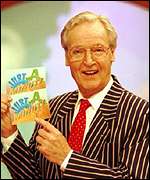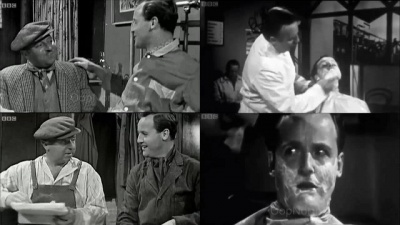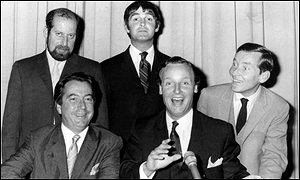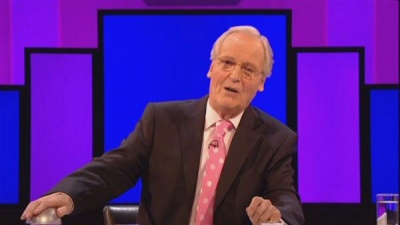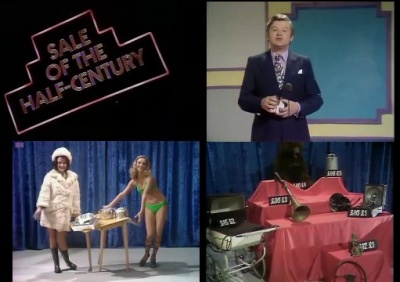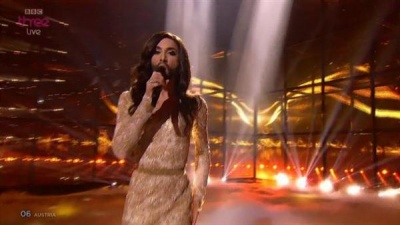Weaver's Week 2017-08-13
Last week | Weaver's Week Index | Next week
New games have come on air at quite a pace recently. We have a rare chance for a breather, and can discuss a living legend.
Contents |
Nicholas Parsons
Born 10 October 1923
Christopher Nicholas Parsons was born in Grantham. His parents were Paul Parsons, the town doctor; and Nell Parsons, a nurse. The middle of three children, Nicholas was educated at Colet Court, then at St Paul's after his family moved to London. Nicholas was hampered by dyslexia, migraines, and prejudices that forced every boy to write with his right hand. Nicholas's parents believed he would be good at engineering, as he had demonstrated an aptitude for handiwork. They arranged for an apprenticeship at Drysdales, a maker of marine turbines in Glasgow.
Engineering was not young Nicholas's first love. He wanted to perform to a big crowd. As a child, Nicholas had been captivated when the circus came to town, and paraded its animals through the streets. His first turn on the stage came while still at school, he was a schoolboy in an amateur production of The Housemaster by Ian Hay.
So, we have Young Nicholas Parsons, a middle-class English boy, fresh out of public school. And he's in the industrial part of industrial Glasgow. To survive, Nicholas impersonated the powerful, and cracked jokes quickly. He'd earned canings for this attitude at school; in the real world, it worked wonders. Nicholas gained a mechanical engineering qualification in the University of Glasgow, played rugby for the varsity team, and was offered a position in the merchant navy – illness prevented him from taking the post.
While in Glasgow, Nicholas continued to act. He performed in James Birdie's Holy Isle at the Glasgow Citizens' Theatre, and appeared on Carroll Levis's radio show doing his impersonations. His BBC radio début came in 1942, on the Ewen MacGregor play Seal Island. Nicholas made his London stage début in 1945 as Kiwi in The Hasty Heart. His television career began on Boxing Day 1946, in a version of Hay Fever by Noel Coward. Touring productions of Arsenic and Old Lace and Charley's Aunt followed, before Nicholas was engaged in repertory theatre around London.
There were regular radio parts, not least on Much-Binding In the Marsh, and film roles – John Royd in Happy Is the Bride (1958) and Dr Crump in Murder Ahoy! (1964). And there was television work, The Eric Barker Half-Hour, and Here and Now, and children's series Four Feather Falls. He had a residence at the Windmill Theatre, where his comedy entertained the lecherous old men while they waited for "living statues" to disrobe.
The Arthur Haynes Show
Nicholas entered the public consciousness as straight man to Arthur Haynes. (A comedy "straight" man sets up jokes for his partner to hit home.) They'd been thrown together on the flop television show Strike a New Note, which turned into Get Happy and The Arthur Haynes Show. Arthur was a traditional music hall performer, and Nicholas would be the butt of his jokes. Arthur's sketches often imbued the class system of this era: Arthur's working-class character would give the comeuppance to Nicholas's professional character.
For instance, "The Barber Sketch". Nicholas is in the barber's, about to have a wet shave. Arthur is the barber, and his hand trembles when he holds a razor. Nicholas wants to talk to the manager, but Arthur says that the gov'nor don't know about his little problem. Arthur takes a couple of sedatives, gingerly pouring them from their container, and using both hands to lift a glass of water to his lips. Some of it splashes. Nicolas gives the reaction shots, he looks worried, concerned, frightened. Nicholas is nervous, but Arthur is confident. Away he goes, shaving Nicholas at a tremendous rate. "I've got to work fast, before these pills wear off."
Nicholas remembers this as his golden period. Arthur may have had problems remembering the nuances of his lines, but he understood where he wanted the sketch to go, and was endlessly inventive in ways to get there. Beyond the television work, the duo were regulars on the Light Programme's Sunday entertainment London Lights. Their partnership ended by mutual agreement, when Arthur decided to take on new challenges.
Nicholas took on a radio panel game, Whose Baby Are You? He returned to the theatre, in the West End farce Boeing-Boeing. Later he'd star in the farce Say Who You Are.
Nicholas would appear in a real-life farce over Christmas 1967, when students threatened to kidnap him for their rag week appeal. A security detail collected him from his home, and he arrived at the Whitehall Theatre handcuffed to a guard. Between performances, he was kept under guard in his dressing room. The theatre said, "Mr. Parsons is valuable. It would have been disastrous if he had been kept out of the performances because of a prank."
He also spotted a gap in the market. That Was The Week That Was had brought satire to television, but what was radio doing? Nothing. Not a thing. Working with Alistair Foot from the radio version of The Arthur Haynes Show, Nicholas, his wife Denise, and actor Bob Todd gave voice to silly things in the newspapers, did impressions and sketches and comedy songs. Listen to This Space was a music hall act on radio, a little behind the fashion but light years ahead of anything else on radio.
Listen to This Space ran for four series from 1965-68, the cast expanded to include Peter Goodwright and Barry Cryer. The line of descent runs through The News Huddlines and Week Ending to The Now Show and Dead Ringers. It proved popular enough for Nicholas Parsons to be named the Variety Club Radio Personality of 1966. And that proved Nicholas Parsons could work in radio. His game show career was about to begin.
Welcome to Just a Minute
Nicholas worked with producer David Hatch Of The BBC on a format by Ian Messiter. His new version of One Minute Please would be more spontaneous than in the early 1950s, and would no longer be gentlemen versus ladies. A pilot episode was made, it felt like a pilot, and Mr. Hatch Of The BBC threatened to resign before a series was commissioned.
One aspect of the show they did like was Nicholas Parson's chairing. Firm and fair, he was more stilted and a little more pompous than the rest of the programme. Nicholas stayed on as chair for that series, played some matches on the panel in series 2, then returned to the chair from series 3. After some early experiments – "penalty rounds" made the game even harder, "repetition" and "deviation" had unclear definitions – Just a Minute began to settle down.
A regular panel quickly established itself. Clement Freud (raconteur and restaurateur) and Derek Nimmo (waspish comedy actor) were joined by Kenneth Williams (flamboyant comedy actor) and a guest woman. Sheila Hancock, Andree Melly, Aimi Macdonald, and Geraldine Jones were the most common bookings. Peter Jones (1) – the actor, not the sports broadcaster – took Derek Nimmo's place in the 1971 series, and most shows for the next seventeen years would feature three of Freud, Nimmo, Jones, and Williams.
Nicholas Parsons soon got to understand the role of the chairman. He had to give the panel enough leeway to be entertaining, enough slack so they could pull well. But he also had to keep them in bounds, not go too far off the rails, and remain fun for the listener at home. Kenneth Williams would be allowed the mock indignation of catchphrase "They should never have let women on Just a Minute!", but wouldn't be allowed to pursue his (apparently sincere) vendetta against Aimi Macdonald.
"Did I come all the way from Great Portland Street for this?"
Just a Minute rewards spontaneity and improvisation. Beryl Reid came a cropper in the pilot, June Whitfield didn't manage well, but Libby Purves was a surprise hit. Bob Monkhouse only appeared the once, Gyles Brandreth and Tim Rice were inspired bookings who still play. Gyles was rarely booked in the same series as Derek Nimmo – some listeners on squeaky old long wave had difficulty telling them apart.
Originally, Ian Messiter set all the topics for rounds; these days, it's done by the production team. They will often ease new players in, by asking them to start a round on a topic they know a lot about. Tim Rice, the writer of Evita, got to talk about Eva Peron. Nicholas used to send marginal calls to those in the stalls – "if you agree you'll cheer for Kenneth, if you disagree you'll boo for Clement, and you'll all do it together now." Nicholas Parsons therefore invented Ask The Audience.
Each of the original players had their own way of winning the game. Derek Nimmo would become lively and animated, he'd talk twenty to the dozen and hope that no-one would hear the repetition. Peter Jones was the polar opposite, enunciating every word clearly and crisply, giving himself time to think at a slightly slower pace. Kenneth Williams would elongate every syllable of every word to draw out the time until something snapped – often another player's patience, and buzz him for hesitation. Clement Freud would compile lists, give many examples of things that could fall into this category – much to Wendy Richard's irritation.
Evolution of the minute
The original musketeers came off air in 1988, after Kenneth Williams' death. Radio 4 considered ending the programme, but heard that the World Service would commission the show itself, and gave way to the inevitable. The next year – at Nicholas Parsons' own insistence – the young Paul Merton graced the stage. Then came Tony Hawks, Stephen Fry, Graham Norton, Sue Perkins. Slowly, steadily, one by one, the old guard of comedy actors left this earthly stage, and all the modern comedians reported for duty.
Just a Minute has tried to come to television a few times. Carlton Television made two series in the mid-1990s, hidden away in a late-night slot, and with more inexperienced players than might be ideal. The BBC had a daytime series in 1999, with variable amounts of experience and age. A teatime version on BBC2 in 2012 had the right balance of experience and novelty. They tried a production at the Edinburgh Festival in 1993 – a midday start was too early for many performers, and "standby" contestant Graham Norton took to the stage most days.
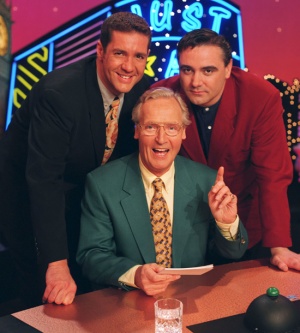 Dale Winton and Tony Slattery, from a 1995 television series.
Dale Winton and Tony Slattery, from a 1995 television series.
Throughout, Nicholas Parsons has hosted the game. Back in their day, Williams and co might scent weakness, and savage Nicholas like a pack of hounds. The modern crew, led by Paul Merton and the evergreen Gyles Brandreth, treat Nicholas with respect. They will josh with the chairman, they'll play to the crowd, but there's so much affection that the players don't cross Nicholas. They don't dare, the audience would tear them limb from limb.
Most of the Just a Minute archive is no longer repeated by the BBC. Following his death, we found out that regular panellist Clement Freud had abused children. This claim is not disputed by Freud's widow. BBC Entertainment's policy is not to repeat archive shows featuring performers who have such allegations against them. As a result, the BBC history of Just a Minute loses almost all of its shows from the 20th century, and a large chunk from the aughts.
Our view? This is a loss for radio history, though perhaps not so much for contemporary entertainment. Listening with mature ears, it is a different programme. Peter Jones was as laidback as the modern players, and Kenneth Williams lived on a different world, just as Paul Merton does now. But there was a competitive streak – Derek Nimmo and particularly Clement Freud wanted to win more than they wanted to entertain. We find it difficult to equate this show with the free-wheeling whimsey on air now.
The modern era of Just a Minute gradually took over during the 1990s, and shows become more familiar from about 1996. Heck, that's two decades of consistently good comedy.
Running up that Hill
Nicholas had never been off the television, but Know Your Onions on BBC2 was "a kind of game about food and wine", not a mainstream hit. His big engagement in the early 1970s was playing the straight man to Benny Hill. This was a difficult relationship, as Benny and Nicholas had different ideas. For Benny, the straight man sets up lines for the star (himself) to knock back. Nicholas would rather crack a few feeble jokes himself, in part to keep the audience warm, and in part to show the comedy genius of Benny Hill.
Some years later, a photograph of Nicholas returned to the Benny Hill Show. TV Tropes explains, "Nicholas Parsons is the sort of clean-living, squeaky-clean TV and radio personality who a young damsel could trust with her virginity, her wealth, or her ageing parents, knowing they're in safe hands. Comedians make much mirth from the sort of personality this implies – either oleaginously greasy, or utterly boring. Even in 1979, Benny Hill regarded Nicholas as a National Living Treasure, a totally decent and likable guy. So in a Wonder Gran sketch, Dracula would be repelled by a picture of Nicholas Parsons."
Looking back, we're surprised at how cutting The Benny Hill Show could be. There were the chase scenes, the bawdy innuendo, the single-entendres. But there was also some very media-savvy decoration. One sketch, Sale of the Half-Century, opens with a fake menu of shows on ITV tonight. It's on screen for a few seconds, not long enough to appreciate "Gnus at Ten". Then there's a pastiche of the opening titles for a popular game show, with Benny Hill as Nicholas Parcel.
Of course, being a Benny Hill sketch, it's predicated around the host wanting to get to know one of the female contestants better. But there's much more: an instant prize of a table leg, Peter Fenchurch on the organ, and a host saying "well done" in a slightly oily manner. It's almost as if this was a pastiche of an existing show...
{whistle blows}
...but we have no more time on this edition! (audience whoops and cheers) Join us again next time (audience groans) as we take to the air and review the later television career of Nicholas Parsons.
This Week and Next
Democracy season begins earlier this time, because we get to vote at Junior Eurovision. Television's leading talent contest will allow internet voting this year. Vote lines open on Friday afternoon, ahead of the Sunday show; voters will need to watch a montage from rehearsals, and will be able to see extended highlights of songs. There will be further votes during the live show on Sunday. The total vote will balance the jury vote; last year's experiment in Eurovision Experts will not be repeated.
The only competing broadcaster in these islands is TG4, generally unavailable outside Ireland. We hope that Fun Kids will continue their successes with the contest.
There will be other talent shows this autumn, and the BBC has wheeled out its own glitter cannon. Competing on Strictly Come Dancing this year are:
- Mollie King, 20% of The Saturdays.
- Davood Ghadami, from The Eastenders.
- Ruth Langsford, sometime host of ITV's This Morning.
- Gemma Atkinson, plays Lisa Hunter on Hollyoaks.
- Richard Coles, vicar and communard.
- Joe McFadden, Raffaello di Lucca on Holby City.
More names will be named over the coming weeks. We'll bring you any news about Mel Giedroyc, Craig David, or Hero The Hedgehog,
Sad news for Conchita Wurst fans, as the performer has cancelled gigs in Edinburgh. The backing band were refused entry by isolationist border guards, and Conchita will not perform with anyone else. Letters of complaint should be addressed to the minister responsible, Amber Rudd.
Last year, ITV showed the pilot of Spotless, a show where the object was not to get splashed with paint. We said, "Could do well on export, it's big and brash but in a way the ITV audience don't get." This week, we learn that Spotless has been exported, and is looking for contestants in California. It'll be made for the children's channel Nickelodeon.
Only Connect was BBC2's only quiz. Snake Charmers (Thomas Rychlik, John Howe, Kate Pfeffer) beat Extras (Vikram Vasu, Vinod Ganesh, Shrikant Narasimhan) by 26-12. Extras had the lead after the first Connections round, but Snake Charmers scored three threes in Sequences, and the win was never in doubt.
BARB ratings in the week to 30 July.
- Diana Our Mother (ITV, Mon, 8.8m) the top show of all, an interview with William and Harry about their deceased parent. Top game was a tie, between new Who Dares Wins and a two-year-old Pointless Celebrities repeat (both BBC1, Sat, 3.6m).
- Between these winners on the schedule was a repeat of Would I Lie to You (BBC1, Sat, 3.5m). Over on ITV, Catchphrase (Sat, 3.2m) and The Chase (Fri, 2.55m) pulled good numbers.
- Love Island finished with 2.85m viewers (ITV2, Mon). Easily beat University Challenge (BBC2, Mon, 2.45m), but behind popular drama Game of Thrones (KYTV Wet, Sun, 3.25m). So not only have the dragons beaten Love Island, they've also beaten Mr Chips and are closing in on Richard Osman.
- Big Brother also finished. Friday's final pulled 1.04m viewers, much of the final week was below 1m and beneath ancient Aussie soap Neighbours. To rub salt in the wounds, Love Island The Reunion (ITV2, Sun) attracted 1.98m viewers.
- Coach Trip Road to Zante began (E4, Mon, 540,000), but lost a quarter of its audience over the week. and Four in a Bed (More4, Sun, 280,000) scored well.
Noel Edmonds is back, and it's Cheap Cheap Cheap (C4, weekdays). Celebrity Masterchef and A Question of Sport start new series (BBC1, Wed), and Masterchef Australia kicks off (W, weekdays). The BBC New Comedy Award is handed out (R4, Sun; red button tv, Thu). And on Saturday, Len Goodman's Partners in Rhyme (BBC1).
Photo credits: ATV, Thames, BBC, EBU/SVT.
To have Weaver's Week emailed to you on publication day, receive our exclusive TV roundup of the game shows in the week ahead, and chat to other ukgameshows.com readers, sign up to our Yahoo! Group.

